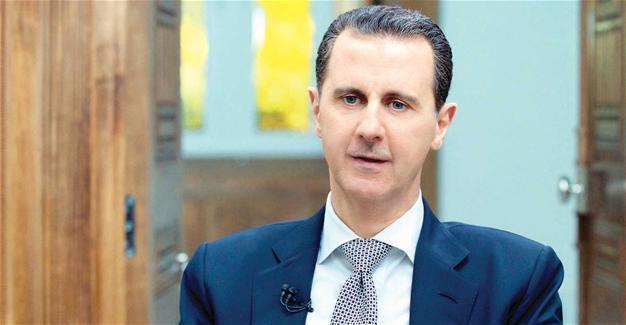Samples from Syria’s Idlib test positive for sarin gas: Chemical weapons organization
AMSTERDAM

Samples taken from a suspected poison gas site in Syria’s northern Idlib governorate tested positive for the nerve agent sarin, the British delegation at the Organisation for the Prohibition of Chemical Weapons (OPCW) said on April 13.
“U.K. scientists have analyzed samples taken from Khan Sheikhoun. These have tested positive for the nerve agent sarin, or a sarin-like substance,” the delegation said during a special session on Syria at the OPCW in The Hague on April 13, Reuters reported.
The U.K. result confirmed earlier testing by Turkish authorities that concluded that sarin had been used for the first time on a large scale in Syria’s civil war since 2013.
Turkish Health Minister Recep Akdağ said April 11 that laboratory results have shown that sarin gas was definitely used in the attack on Syria’s Idlib on April 4 that killed at least 87 civilians.
“As a result of blood and urine samples taken from the victims subjected to the use of chemical war material in Idlib, Isopropyl methylphosphonic acid, the metabolite of sarin gas, was confirmed,” Akdağ said.
Meanwhile, sources talking to Reuters said that OPCW investigators have gone to Turkey to collect samples as part of an inquiry into the alleged chemical weapons.
The fact-finding mission was sent by the OPCW in The Hague to gather bio-metric samples and interview survivors, sources told Reuters on April 13.
The toxic gas attack on April 4, which killed scores of people including children, prompted a U.S. cruise missile strike on a Syrian air base and widened a rift between the United States and Russia, a close ally of Syrian President Bashar al-Assad in his conflict with rebels and militants fighting to oust him.
The OPCW mission will determine whether chemical weapons were used, but is not mandated to assign blame. Its findings, expected in 3-4 weeks, will be passed to a joint United Nations-OPCW investigation tasked with identifying individuals or institutions responsible for using chemical weapons.
Syria’s Assad says chemical attack ‘100 percent fabrication’On April 13, al-Assad said the suspected chemical weapons attack was a “fabrication” to justify a U.S. strike on his forces, in an interview with AFP in Damascus.
The embattled leader, whose country has been ravaged by six years of war, said his firepower had not been affected by the attack ordered by U.S. President Donald Trump, but acknowledged further strikes were possible.
Al-Assad insisted his forces had turned over all their chemical weapons stocks years ago and would never use the banned arms.
“Definitely, 100 percent for us, it’s fabrication,” he said of the incident.
“Our impression is that the West, mainly the United States, is hand-in-glove with the terrorists. They fabricated the whole story in order to have a pretext for the attack,” added al-Assad, who has been in power for 17 years.
At least 87 people, including 31 children, were killed in the alleged attack, according to the Britain-based Syrian Observatory for Human Rights monitor.
But al-Assad said evidence came only from “a branch of al-Qaeda,” referring to a former jihadist affiliate that is among the groups that control Idlib province, where Khan Sheikhun is located.
Images of the aftermath, showing victims convulsing and foaming at the mouth, sent shockwaves around the world.
But Assad insisted it was “not clear whether it happened or not, because how can you verify a video? You have a lot of fake videos now.”
“We don’t know whether those dead children were killed in Khan Sheikhun. Were they dead at all?”
He said Khan Sheikhun had no strategic value and was not currently a battle front.
“This story is not convincing by any means.”
Despite the OPCW’s investigation, Russia on April 12 blocked a U.N. Security Council resolution demanding Syria cooperate with the probe.
And al-Assad said he could “only allow any investigation when it’s impartial, when we make sure that unbiased countries will participate in this delegation in order to make sure that they won’t use it for politicized purposes.”
Al-Assad said more U.S. attacks “could happen anytime, anywhere, not only in Syria.”
But he said his forces had not been diminished by the U.S. strike.
“Our firepower, our ability to attack the terrorists hasn’t been affected by this strike.”
Meanwhile, the Syrian army said an air strike late on April 12 by the U.S.-led coalition hit poison gas supplies belonging to the Islamic State of Iraq and the Levant (ISIL), releasing a toxic substance that killed “hundreds,” but the coalition denied carrying out raids in the area.
A statement by the army, flashed on April 13 by Syrian state TV, said the incident in the eastern Deir ez-Zor province proved that ISIL and al-Qaeda-linked militants “possess chemical weapons.”
The report could not immediately be independently verified.
U.S. Air Force Colonel John Dorrian, a spokesman for the coalition, said it had carried out no air strikes in that area at that time.
“The Syrian claim is incorrect and likely intentional misinformation,” he said in an email to Reuters.
The Russian Defense Ministry has no information about people who were killed in an attack carried out by international coalition forces, Igor Konashenkov, the Defense Ministry’s spokesman said on April 13, RIA news agency reported.
Konashenkov said Russian forces sent drones to check the area.
 Samples taken from a suspected poison gas site in Syria’s northern Idlib governorate tested positive for the nerve agent sarin, the British delegation at the Organisation for the Prohibition of Chemical Weapons (OPCW) said on April 13.
Samples taken from a suspected poison gas site in Syria’s northern Idlib governorate tested positive for the nerve agent sarin, the British delegation at the Organisation for the Prohibition of Chemical Weapons (OPCW) said on April 13.